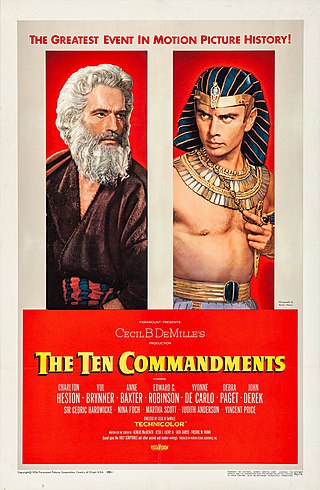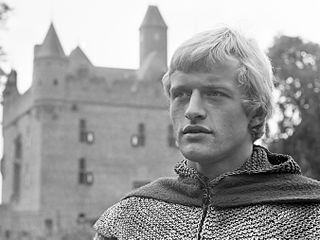Related Research Articles

The Ten Commandments is a 1956 American epic religious drama film produced, directed, and narrated by Cecil B. DeMille, shot in VistaVision, and released by Paramount Pictures. The film is based on the 1949 novel Prince of Egypt by Dorothy Clarke Wilson, the 1859 novel Pillar of Fire by J. H. Ingraham, the 1937 novel On Eagle's Wings by A. E. Southon, and the Book of Exodus, found in the Bible. The Ten Commandments dramatizes the biblical story of the life of Moses, an adopted Egyptian prince who becomes the deliverer of his real brethren, the enslaved Hebrews, and thereafter leads the Exodus to Mount Sinai, where he receives, from God, the Ten Commandments. The film stars Charlton Heston in the lead role, Yul Brynner as Rameses, Anne Baxter as Nefretiri, Edward G. Robinson as Dathan, Yvonne De Carlo as Zipporah, Debra Paget as Lilia, and John Derek as Joshua; and features Sir Cedric Hardwicke as Seti I, Nina Foch as Bithiah, Martha Scott as Yochabel, Judith Anderson as Memnet, and Vincent Price as Baka, among others.

Floris is a 1969 Dutch action television series starring Rutger Hauer and Jos Bergman, written by Gerard Soeteman, and directed by Paul Verhoeven.

Cinema of the Netherlands refers to the film industry based in the Netherlands. Because the Dutch film industry is relatively small, and there is little or no international market for Dutch films, almost all films rely on state funding. This funding can be achieved through several sources, for instance through the Netherlands Film Fund or the public broadcast networks. In recent years the Dutch Government has established several tax shelters for private investments in Dutch films.

The Ten Commandments is a 1923 American silent religious epic film produced and directed by Cecil B. DeMille. Written by Jeanie MacPherson, the film is divided into two parts: a prologue recreating the biblical story of the Exodus and a modern story concerning two brothers and their respective views of the Ten Commandments.

Halina Reijn is a Dutch actress, writer and film director.

Kim van Kooten is a Dutch actress and screenwriter. In international cinema, she is best known for the 2003 Dutch/US co-production Phileine Says Sorry, filmed partly in New York City, in which she plays the lead. She is the author of the script of the very successful Dutch movie Alles is Liefde, and won a Golden Calf for Best Actress in Phileine Says Sorry (2003), and for Best Scenario with Met grote blijdschap (2001).

Robert Piet Houwer is a Dutch film producer. He studied at the University of Television and Film Munich, Germany. In 1964 he directed the short film Anmeldung (Declaration) which was awarded a Silver Bear at the Berlin Filmfest. During the 1960s, Rob Houwer became one of the most prolific producers in Germany, with directors Volker Schlöndorff, Peter Fleischmann, Johannes Schaaf (Tattoo), Michael Verhoeven and Hans-Jürgen Syberberg. Upon his return to the Netherlands in 1971, he frequently collaborated with Paul Verhoeven and produced most of his Dutch films. Turkish Delight (1973), based on the novel by Jan Wolkers, became the most frequently visited film in Dutch cinema and still holds that place today. The relationship between Houwer and Verhoeven ended when Verhoeven moved to the US in 1985. Houwer's later films did not always enjoy the huge commercial success of his early productions. The Dragon That Wasn't , supervised by Houwer and artist Marten Toonder became the All-Time Number One Dutch animated feature at the box office. Some of his later productions were considered to be among the worst in Dutch cinema by critics: De gulle Minnaar (1990), De Zeemeerman (1996) and Het woeden der gehele wereld (2006). He was appointed the Order of Orange-Nassau.

Willy Geertje van Ammelrooij, known as Willeke van Ammelrooy, is a Dutch actress.
Joram Lürsen is a Dutch film and television director, as well as screenwriter and producer.

Rijk de Gooyer was a Dutch Golden Calf-winning actor, writer, comedian and singer. From the 1950s until the early 1970s, he became well known in The Netherlands as part of a comic duo with John Kraaijkamp, Sr. In the United States best known for having small roles in films such as Nosferatu: Phantom der Nacht, Soldaat van Oranje, A Time to Die and The Wilby Conspiracy.
Havinck is a 1987 Dutch drama film directed by Frans Weisz. It was screened in the Un Certain Regard section the 1988 Cannes Film Festival.
Adriaan Ditvoorst was a Dutch film director and screenwriter. He directed nine films between 1965 and 1984. His 1967 film Paranoia was entered into the 17th Berlin International Film Festival.

Ruud van Hemert was a Dutch film director known especially for (dark) comedy. In the 1970s he helped produce and direct TV shows on VPRO before starting a career as a film director.
The Louis d'Or is a Dutch acting award, given annually to the actor with the most impressive leading role of the theater season. It is awarded by the Vereniging van Schouwburg- en Concertgebouwdirecties (VSCD), the main trade organisation for theaters in The Netherlands. The award itself is a golden medal, currently designed by Eric Claus. It was named after the Dutch actor Louis Bouwmeester. Its female counterpart is the Theo d'Or.

Manja Croiset is a Dutch poet, writer and recitation artist.

Het is weer zo laat!, also known as Waldolala, is a Dutch television show from 1978, written and directed by Wim T. Schippers and co-produced by Schippers, Gied Jaspars, Wim van der Linden en Ellen Jens. It was the last TV show written for Dolf Brouwers, who had played the character Sjef van Oekel in previous shows.

Maria Strick was a Dutch schoolmistress and calligrapher. She published four writing manuals, making her a key figure in the so-called ‘golden age of Dutch calligraphy’ and virtually unique among women calligraphers until the twentieth century.

Art Rooijakkers is a Dutch television presenter. He is best known as the presenter of the popular television show Wie is de Mol? from 2012 to 2018.
Love in a Bottle is a Dutch romantic comedy directed by Paula van der Oest.
References
- 1 2 "De Mantel der Liefde - vpro cinema". www.vpro.nl.
- ↑ Verstraten, Peter (29 April 2016). Humour and irony in Dutch post-war fiction film. Amsterdam University Press. ISBN 9789048528370 – via Google Books.